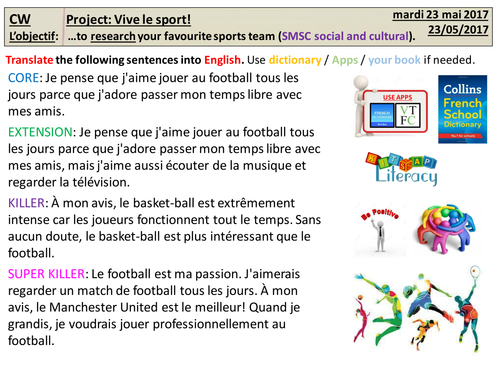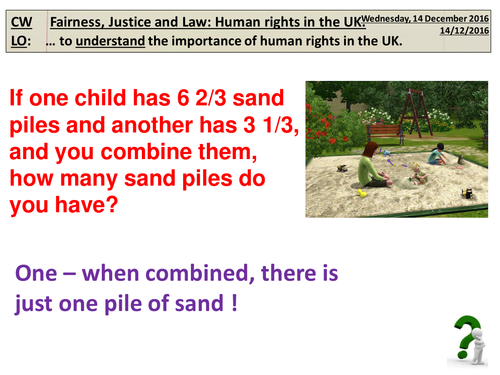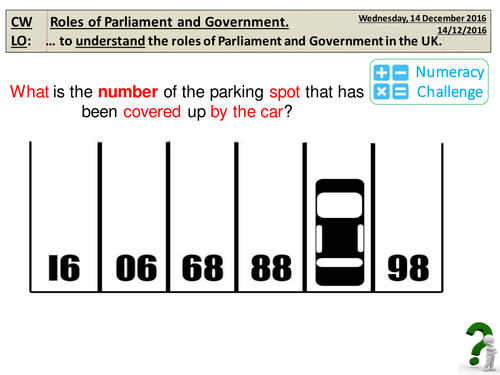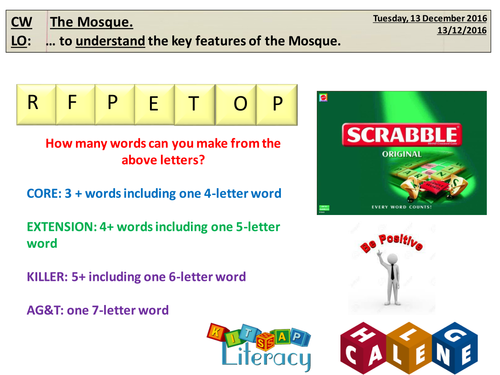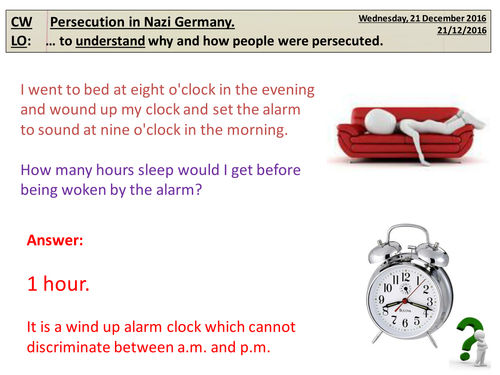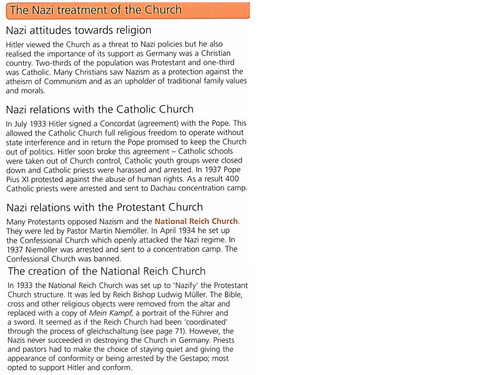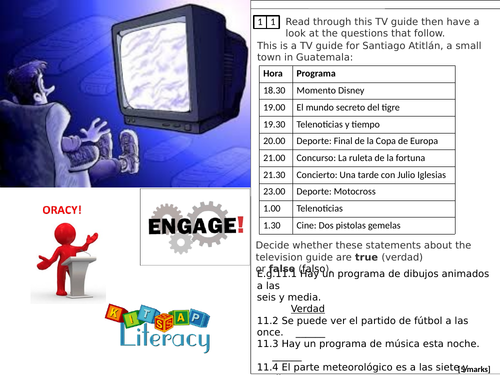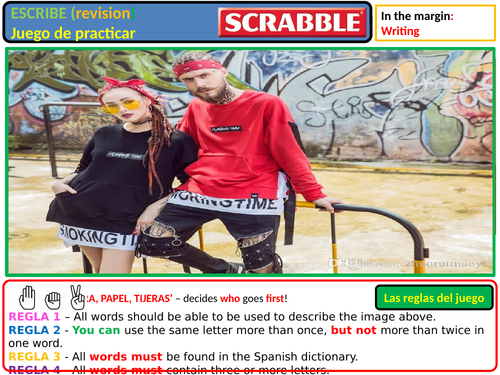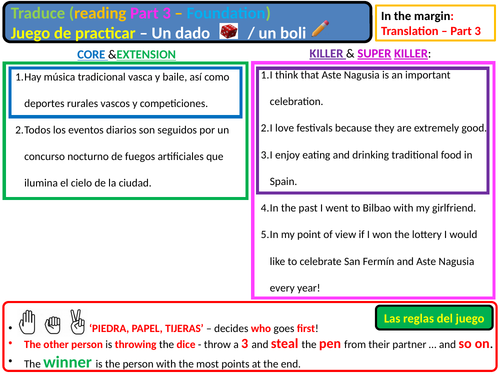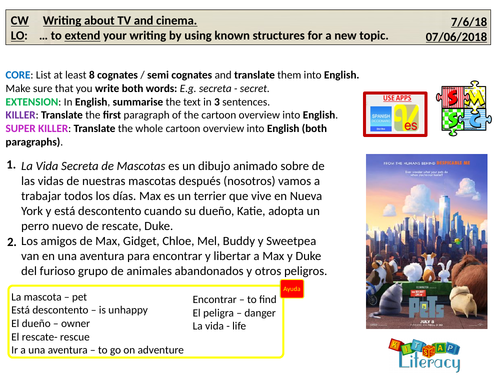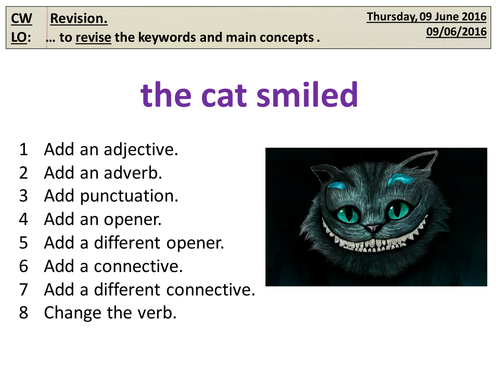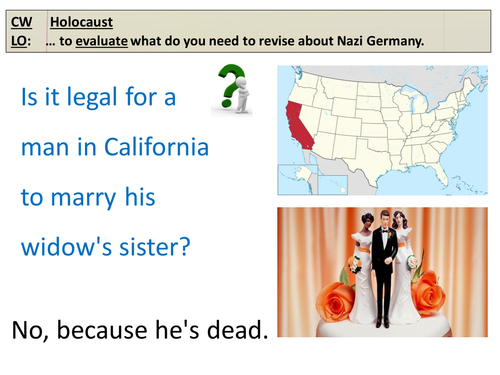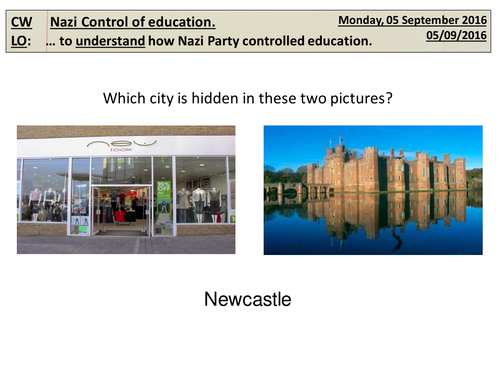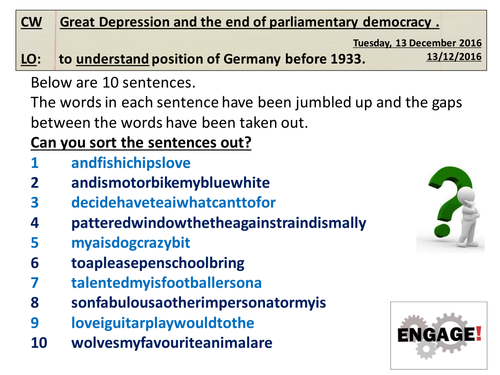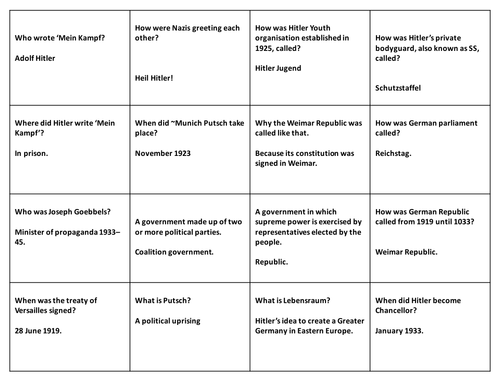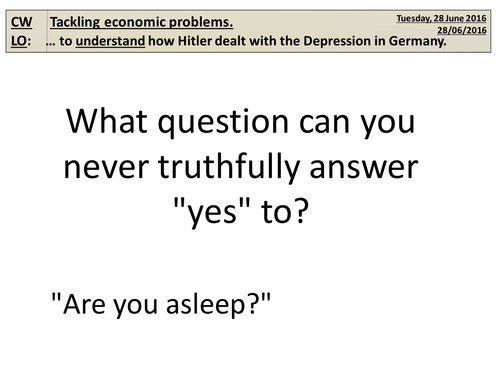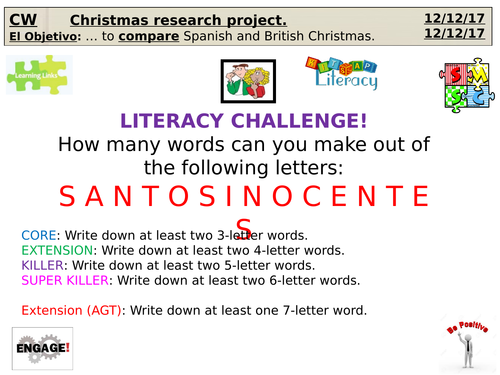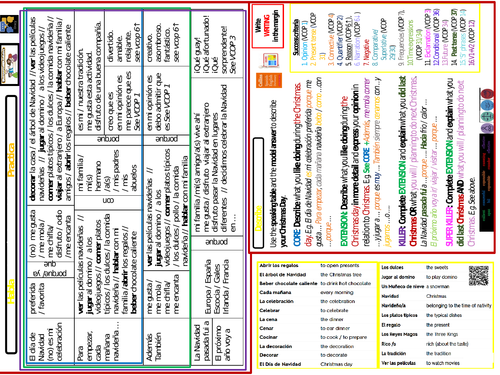
121Uploads
35k+Views
5k+Downloads
All resources

Research project (Motivational triggers) for KS3 French - Vive le sport!
This is a research project lesson (or two lessons really) that I created for my year 7 French students. The writing example can be easily adapted if more structures are to be added. The idea is to promote independent learning via research. Students have to research information about a sports team and create a poster. After that they have to produce a piece of writing to express their opinion on that team. Students decide on the task, the roles and start researching relevant information using their iPads (one of the students needs to summarise the information that others found). The whole process takes about 2 lessons and is perfect for the end of the topic as you can incorporate all of the structures / vocabulary learned during the term!

4. Fairness, Justice and Law
This lesson was prepared for the year 11 Citizenship students (AQA full course). This lesson is on the topic of Fairness, Justice and Law: Human rights in UK. It includes settler, starter, learning objectives/keywords introduction slide, a quick match-up activity to revise some keywords, the slide with information on the Human Rights Act 1998, some activities for discussion of the latter (I especially like the activity where they have to guess the rights!) and exam practice materials. The latter is an example of a part B question (4 c) with a model answer and success criteria, followed up by the self-assessment slide. The presentation ends with a cartoon for a plenary discussion.

5. Roles of Parliament and Government
This lesson was prepared for the year 11 Citizenship students (AQA full course). This lesson is on the topic of Roles of Parliament and Government. It includes settler, starter, learning objectives/keywords introduction slide, a keywords quiz, some key information and call for discussion on the roles of the governing system in UK (Parliament-Monarch), a short quiz to check the understanding of information presented, some information and Round Robin activity on the Government in UK, Keywords Challenge slide (to revise the keywords!), and some exam practice on the questions of the Part B (4 a and 4 b) with success criteria, model answers and self-assessment. The presentation ends with a cartoon for a plenary discussion.

KS3 -Islam: Halal / Haram, Mosque and Qu'ran
These are three lessons on Islam that I have prepared for the KS3 RE class. They all include settlers, starters, lesson objectives, keywords, Kagan-type activities featuring SMSC. Enjoy!

Persecution in Nazi Germany
This lesson is about Persecution in Nazi Germany. It includes a settler, an example of how students' exercise book is supposed to look like, a starter (scrabble task), learning outcomes slide, 'Make your own Quiz quiz trade' task (song above is taken from youtube and is used as a background why the students are completing the task), oral task to compare Aryan and Jewish families, Oracy leader task based on the quote by Adolf Hitler and a Think Pair Share slide in regard to the persecution of minorities.

Nazi Treatment of the Church
This lesson is about Nazi treatment of the Church. The lesson includes a settler, a starter (exam question with success criteria, model answer, peer assessment, SPAG control slides), learning outcomes, a slide to discuss the similarities / differences between Nazism and Christianity, information research slide (based on the page from the revision guide attached to this resource), a creative task (create a caption for the photograph of a Nazi Church) and Keywords revision activity.
Please note that the handout is the print screens of the WJEC GCSE Histroy revision book and I therefore claim no authorship for the same.

AQA GCSE Spanish - SMSC/Cultural- Las Hogueras de San Juan Listening A + writing FQ1/ HQ4
This is the lesson that I have prepared for my higher y8/ and y9/y10 in relation to the topic of Spanish culture (Festivals & Celebrations).
The starter is based on the review of the cartoon called ‘The Book of Life’ (El Libro de la Vida). Students read the review and complete various tasks according to their ability. Then they check their answers, review the lesson objectives and have fun resiting a tongue twister (I personally believe phonics is the way forward for the students of all ages). Students will then learn new / revise already known vocabulary on the topic of Las Hogueras de San Juan festival using Quizlet and Quizlet live tools. I have then included a video (see link) of Rosa from SpanishPod101 (see their channel in youtube) describing the festival.
Even though the video is in Spanish and Rosa speaks really quickly, there are subtitles in English so that all students have a chance to listen to a native speaker and at the same time understand what the video is about (note: I personally find the Spanishpod101 videos amazing as they address quite a few cultural / grammar / pronunciation and other aspects so I would recommend letting your students know that a lot of resources are available for free. Consequently, students answer quiz questions about the video. I presented it as a Listening task.
Then they move on to Writing Foundation Questions 2 and 4 // Higher Tier Question 1. Students begin by translating the short text into English and coaching each other if stuck at the same time assessing each others work. Then they revise some grammar by playing tarsia game (see template in the end of the presentation).
Consequently they get on with reading the question and what is required from them and discussing the what they could include in their answer (both content and grammar structures). Then they make a break and play a dice game (can be prepared prior to the lesson or during the same - see template in the end of the presentation) and a learning grid to revise verb tenses. They then get back to the task and work in pairs to plan their answers. Finally they complete the task individually, discuss the success criteria and the marking scheme with the teacher and peer / self assess their work.
And, as a reward they play Hangman! (I have posted this slide for free within my resources - search for ‘El ahorcado’).
Please let me know if there are any problems / ideas!

TV shows / TV program - Spanish- AQA GCSE Reading (Sec. A- T/F) differentiated
This is a lesson on TV shows for an early GCSE Spanish class which can be used with a higher year 8 students. The lesson includes a scrabble starter to wake the students up followed by phonics practice (resiting tongue twister!). Then I included few slides explaining how to use VES application to check the meaning of conjugated verbs and asked them to try to find few on their own to check understanding and to encourage them to be independent.
Then they practice phonics when pronouncing new words (see new vocabulary attached - quizlet) followed by the quizlet activity. Students are to choose what quizlet task they want to do based on their level therefore this engaging task is differentiated. Then I have included a set of slides to introduce a reading section A exam task text - TV program (please note that this is a task taken from BBC Bitesize website and I bear no right on it therefore) . There is also a differentiated Rally Coach activity to consolidate the knowledge of the new vocabulary after they looked at the task whereby they try to translate the sentences in relation to opinions on TV programs. Consequently they have a look at the TV program text again and complete a series of tasks to enhance their understanding - underline cognates, discuss unknown words in a group and learn how to use Spanish Dict application (an explanatory slide given). Finally they analise the way they should answer the questions (True / False) and complete the Reading task and self-assess their work. I have included the handout with the reading task to ease the pain.
Enjoy!

AQA GCSE Photo card scrabble / Tarsia games with templates (speaking / writing /revision)
These are two grammar games that I decided to share. I would use them for pretty much all age groups, both KS3 and KS4, GCSE both tiers. They can be easily amended to suit the grammar topics that you wish to reinforce / revise / introduce. The templates can also be easily reused for French.
See enclosed:
Photo card scrabble (related to AQA GCSE speaking / writing tasks). I originally thought of this as a game prior to completing an exam task for KS4 students. The pack includes a slide and a scrabble board if you wish to organise an extended activity. Students need to come up with words related to the image, the words should contain 3 or more letters and they should be in Spanish!
Tarsia slide and template - an activity to use to revise topic / key vocabulary. Students can either create their own or just cut the one you prepare for them. They need to then match the words / expressions in English with their Spanish equivalents.
Let me know how it goes!

Spanish Translation game (AQA GCSE Reading Part C / Writing Section 3)
One of my KS4 students favourite games!
One dice, one pen (un dado, un boli) - (differentiated, AQA Reading Section C / Writing Part 3 Higher / Foundation) - Students roll dice in turns to translate the sentence correctly! If the partner throws 3 he takes over a pen. The winner is the one who collected the most points. I used it with KS4 to facilitate the exam translation tasks.
I also included a set of slides that I used to emphasize certain grammar points.
Let me know how it goes!

Writing: TV and cinema (opinions) - Spanish - AQA KS3/KS4 GCSE (Speaking / Writing)
This is a lesson on TV shows for an early GCSE Spanish class which can be used with a higher year 8 students.
The lesson starter is a differentiated reading / writing / grammar task based on the review of a famous cartoon - Secret Life of Pets. Students read the overview of the cartoon and complete the tasks. Then they check the answers followed by phonics practice (resiting tongue twister!). Then I included a mini-test to recap / check whether students remember how to conjugate ‘tener’ in present tense. Consequently they play the Speaking Cube - 6 sides of the cube are completed with the topic questions for the half-term. Students roll a cube (you can either ask them to glue them together or you can make them yourself). I figured 6 cubes per year for each year group is an easy enough task to continue repeating the questions of all half-terms for the whole school year. The template is in the end of the lesson in case you need to change the questions (colours correspond to the difficulty of the question (core- blue, extension is green, violet is killer and pink is super killer).
Then they get to revise verb 1 + verb 2 structure and complete a writing task. Before writing I tried to give them some ideas by showing them the Spanish trailer of the cartoon mentioned in the starter activity (they loved it!). The trailer is from Youtube. Finally they self/peer -assess their work by way of analising the success criteria and play a vocabulary game as a reward. The younger students might be allowed to use a dictionary or to think of any word. In any case, feel free to change the rules!
Please let me know if there are any problems / ideas! Enjoy!

Nazi Germany Revision lesson 1 (From Weimar problems to the popularity of the Nazi Party)
This is a revision lesson to look through some of the events in the Nazi Germany such as Hitler becoming a Chancellor (exam question wit success criteria and peer-assessment help slide), Versailles Treaty (video and a task), problems faced by the Weimar Governemnt (video and a task) and a source-based exam question asking students to explain why people supported the Nazi party. The latter also has an example (see file attached). I have also included a settler and a Team Challenge activity (see file attached) that asks students to answer the questions . I usually give one sheet to each table and set the rewards for the ones who will finish it first.

Holocaust Revision / Boy in the Striped Pyjamas
This resource is based on the fact that students are watching the movie named above and the teacher is stopping it to ask the questions and students answer the same. The lesson includes a settler, homework reminder (I tend to ask for the same to be completed in the google classroom), Learning Outcomes, slide with some questions (you can find the timings for the scenes online), Oracy activity, Ask a question (read the instructions on the slide, I use it quite often and question starters are provided on the next slide), mini-plenary and a 'Make your own Quiz Quiz Trade' slide in case you have some time left. This lesson can be broke into several lessons, depending whether you have time to watch it all at once.

Education in Nazi Germany
These are two lessons (one is modified for a different group - beginning is slightly different) on the topic of Education in Nazi Germany. The lessons include such activities as settler, starter, exam question with a model answer and success criteria as well as a research task (using book / internet) together with some revision exercises such as Quiz-Quiz-Trade and Keywords revision. I also enclose a handout that I use to print for the students so they do not read the sources from the board.

Nazi Germany: Great Depression and the end of parliamentary democracy
The lesson for GCSE History about the Development of the Nazi Party, for instance, the impact of the Great Depression, The Bruning, Von Papen and Schleicher Coalitions, an exam question and a usual Plenary and Food for thought. I am usually using the WJEC book and a revision guide as an additional resource in case they need a reference or a mean to get 'unstuck' when completing an exam question task. They are also using it to draw a timeline / summarise main facts via spider diagram. I have used Section 7.2 of the Revision Guide in this instance.

Consolidation of Nazi Power
This lesson is about the Consolidation of the Nazi power. It includes some exam practice, Quiz-Quiz trade activity (see worksheet attached) and an Ipad research activity with a true/ false plenary. In my experience, when you cannot book the Ipads or any other resources, you can have a look for a useful information on the internet and print a page for students to find the answers.

Nazi policies to address economic problems
This lesson is about
The lesson includes a settler, and exam question (WJEC, as usually), All Speak Round Robin activity of the economic problems in Nazi Germany and an I-pad research slide on the ways HIler tried to address the economic problems of the country at the time. As per my previous lessons, it is very easy to adapt 'I-pad research' slide to your needs by providing them with a reference to the pages in the book or by printing some summary out (I like using BBC Bitesize). I then finished the lesson with a 'Keywords' plenary which you can organise however you prefer.

Research project (Motivational triggers) for KS3/KS4 Spanish AQA - Christmas project
This is a research project lesson (or two lessons really) that I created for my KS3/lower KS4 Spanish students. The idea is to promote independent learning via research.Students have to research information about Spanish Christmas, compare the traditions with the ones in Britain and to create a presentation / poster. Students decide on the task, the roles and start researching relevant information using their iPads (one of the students needs to summarise the information that others found). There is also a designer and an analyst (usually the most attaining student in the group. Enjoy!

Your Christmas Day - KS3/KS4 Spanish (AQA)- Observation 1c/2a
This is a Christmas lesson that I created for my higher KS3/KS4 Spanish students and mainly for my lesson observation. The idea is to have some fun and to do some writing as well!
The lesson starts with a friendly - easy starter and pronunciation slide to learn how to pronounce some Christmas / winter related words. Then we move on to a quizlet task to learn / revise some X-mas vocabulary and Rally Coach activity to check whether we remember the words. I have then included a conjugation activity with the Christmas verbs (you need some dices!) followed by a competitive translation activity (make sire you have similar ability students working together). The students then use a trap door structure (table) to speak about their Christmas day and then I tell them about my Christmas day in a similar manner as suggested by previous activity. I first use pictures only and then show them the model answer and the grammar success criteria. After they write down their responses we move on to playing quizlet live and Hangman. Enjoy!
Bundle

Christmas bundle- Spanish/French - KS3/KS4 AQA
This a small bundle of two (possibly three) lessons for KS3/KS4 Spanish students. I also attach its analogue in French. Part of it is a research project than can take 1-2 lessons and another one is a lesson to describe your Christmas day in Spanish!

